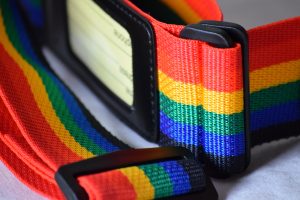Nylon Webbing in the Production of Straps and Belts
High-performance Nylon webbing is a staple material in the production of straps and belts around the world. Nylon offers a range of benefits in the production of straps and belts which makes it popular across a large number of industries from aerospace to fashion, and equestrian sports to freight.
In this article we look at the reasons why Nylon is a popular choice for belt and strap applications, and why Nylon is the perfect choice for the manufacture and production of these kinds of strapping and belts.
Benefits of Nylon Webbing for Straps and Strapping Applications
Nylon webbing is used in high-stress strapping projects such as those requiring harnesses, cargo nets, and a range of military applications.
The key benefits of nylon webbing for straps are:
- High tensile strength – High tensile strength is the maximum stress a material can withstand before breaking, for example by being pulled or stretched by excessive weight. This makes nylon a durable material which can be relied upon for safety-related tasks even in the toughest conditions.
- Abrasion resistance – Abrasion resistance measures the ability of a material to withstand damage and wear caused by friction. High abrasion resistance is important when straps will be subject to friction and movement. The ability of nylon to withstand high levels of friction makes it a great choice for applications where straps will be subject to repeated sliding or rubbing, for instance by mechanical parts. Due to its ability to cope well with repeated mechanical stress, Nylon webbing is ideally suited to hard, outdoor work or sports such as climbing harnesses, parachuting, PPE and similar applications.
- Temperature resistance – With a melting point of 250°C and the ability to withstand temperatures as low as -80°C without losing any strength, Nylon webbing can be relied upon to withstand high and low temperatures. For projects where Nylon straps may be subject to fire, a flame retardant coating can be applied to further improve its ability to withstand heat. Being able to deal with extremes of temperature makes Nylon webbing straps a great choice for the aerospace industry, and for any application where high and low temperatures must be endured with no loss of strength.
- Chemical resistance – In industrial settings, it may be important to ensure straps and strapping are resistant to acids and alkaline if there is a possibility of exposure. Nylon straps have good resistance to dilute acids and common alkalis, though they will decompose in strong acid mixes. Nylon webbing can deal easily with exposure to alcohol, ether and cleaning agents including those used in dry cleaning and oils such as those used in the automotive industry. This makes nylon straps a good choice where they may be contaminated with chemicals.
Benefits of Nylon Webbing for Belts
Flat nylon webbing is commonly used in belts of all different types, from medical to fashion and automotive applications to outdoor pursuits like camping and hiking.
Nylon webbing is common in lifting belts designed to support the back during heavy lifting for commercial or sporting purposes, offering increased flexibility and comfort compared to traditional leather belts of this type.
Nylon belts are also used in healthcare, for example, lap straps and hip straps for wheelchair users, and bed hoists in hospitals.
Probably the most commonly seen Nylon webbing belts come in the form of child safety harnesses, three-point and lap seatbelts in cars, aeroplanes, and other forms of transportation.
The key benefits of nylon webbing for belts are:
- Soft and lightweight – Nylon belts can be manufactured to a smooth and comfortable finish, making them more comfortable for the user to wear for longer periods of time. The shiny texture and smooth feel is a key characteristic of nylon webbing.
- Durability – If treated correctly, Nylon webbing belts can be used over and over again for many years without showing signs of wear or tear.
- UV resistance and high colour retention – Nylon yarns with added stabilisers have a high ability to resist UV rays meaning they retain colour and do not experience damage or degradation in sunlight as some other materials might.
- Dyeing affinity – Nylon can be dyed to almost any colour or shade, making it an attractive option for the fashion industry, and for branded equipment where an exact colour match is required.
The disadvantages of Nylon Webbing:
One of the very few disadvantages to the use of Nylon webbing is that it is not recommended for use in or around water. Nylon absorbs water very quickly and is known to stretch slightly by approximately 2% of its length when wet. It is also slightly weaker when wet, however, of all the webbings, Nylon has the highest tensile strength. It is therefore important to bear this in mind if a webbing is required for a Marine or Water Sports application which relies on low elongation.
Bowmer Bond Nylon Webbing Specialists
If you are looking for Nylon webbing you can find out more about our range on the Nylon webbing page.
Alternatively, contact a member of our team to discuss your requirements and get a quote today.
Posted 23rd May 2022 by Bowmer Bond




